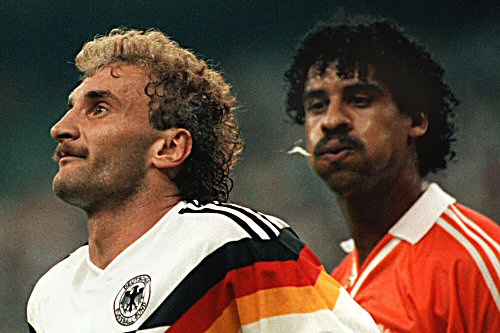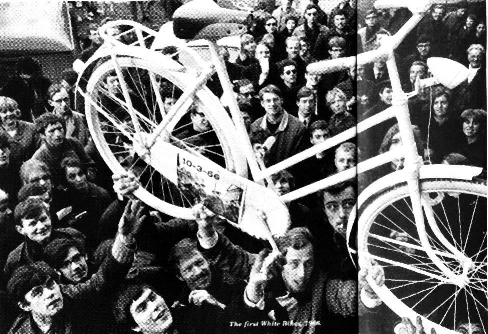Clearly, the foot has incredible symbolic power. Because football revolves around the use of the foot, it has issues of identity, class, and history tied up in it. These issues help to propel football to its premier role in the cultural consciousness, where partly because of its tie to the ‘common man’ and the masses, partly because of its popularity, and party because of its role as liberation, football becomes more than a sport; it is a religion. Nations tie their identities to it, and matches become symbolic of so much more than just a game or just a rivalry - - football becomes an outlet for social and political discourse. Therefore, it becomes a lens through which we can understand the world’s societies. Football is both affected by the culture within which it is played, and shapes it in return.
Nowhere is this more apparent than in the Netherlands, where football to this day acts as a discourse for political and social issues. In Simon Kuper’s seminal work Ajax: The Dutch, The War, he discusses how issues that surfaced during the Second World War still find their outlet in the football of Ajax Amsterdam. A brief walk from the train station to their stadium, the Amsterdam Arena, will show the passerby graffiti written across subway tunnels and bridges revealing the team’s history as the Jewish club of Amsterdam. When the Dutch national team played the Germans during the European Cup in 2004, Dutch supporters chanted “give us back our bicycles” – a reference to the confiscation of bicycles during the Nazi occupation of Amsterdam in 19401. As the photo below of Dutch midfielder Ruud Gullit spitting at Rudi Voller shows, old tensions run deep.

Historically, however, football in the Netherlands has been even more than just an outlet; in the past, social relationships on the field have fundamentally altered the social norms of the entire country. This is evident through perhaps the Netherlands’ most famous contribution to world football – the invention of Totaalvoetbal, or Total Football in English. Total Football was a framework of tactical organization invented by Rinus Michel in the early 1970s, wherein players abandoned their normal fixed positions in favor of a system where every player could play every position. The idea was that the entire team would defend or attack in unison, and every player would fit into a greater whole than the traditional compartmentalized organizations of the past would allow.
The basic premise was that by abandoning their traditional roles, the players would instead focus on moving into whatever space they could find, and that other players could then run into the void left, creating a constant movement of the entire team. To the casual observer, the movement of the team almost resembles flowing water. The fundamental difference between Total Football and previous tactics was that instead of focusing on moving the ball around the space that existed, the players would create new space by constantly moving. When the team attacked, they spread the field to the wings, creating huge, open spaces, attacking with the entire team. When they defended, they condensed around the ball, creating a claustrophobic, cramped field where the opposition had nowhere to go. The entire premise hinged on the idea of manipulating the space of the field, and it resulted in what many say to be the simplest, and the most beautiful, football of the twentieth century. If we watch the video below, we can see how the Dutch widen the space of the field when breaking, and quickly condense it while defending. For a particular example of supreme organization, watch how at 4:44 no less than eight Dutch players pack the middle of the field to play several Uruguayan defenders offside.
[]
This revolutionary playing style that revolved around the obsession and manipulation of space did not appear out of a vacuum - - it fit perfectly into the narrative of Dutch history. In fact, many theorists argue that Total Football could have appeared only in the Netherlands. In David Winner’s groundbreaking book Brilliant Orange: The Neurotic Genius of Dutch Football, Winner traces this obsession with the manipulation of physical space through the history of Dutch thought. As Winner succinctly puts it, “The Dutch think innovatively, creatively and abstractly about space in their football because for centuries they have had to think innovatively about space in every other area of the lives.”2 The Dutch have always had to divide and reallocate space The Netherlands has forever been one of the most densely packed countries in Europe, and so the problem of space utilization and reallocation has been one throughout Dutch history; David Goldblatt has written that Amsterdam, with its dams and levies, is “perhaps the most systematically planned and humanely constructed landscape on the planet. The Dutch have created space by reclaiming land from the sea... defending space through the vast systems of polders, dikes and flood controls…”3 Amsterdam is literally built on the concept of manipulating space. Goldblatt goes on to show how this obsession with space is clear in all areas of Dutch culture; one need only look at Vermeer or Mondrian, whose art consisting of simple geometric elements and simple shapes constantly revolves around questions regarding the allocation and re-imagining of space.
Not only is this use of the football affected by an existing cultural narrative, it has the ability to fundamentally alter the culture within which it is played. Changes in social hierarchy on the football pitch translate into social changes in the classroom, on the street, and in the government. Total Football, with its reliance on movement into space, eradicates existing formations and positions, so on the level of roles, a social hierarchy of positioning on the field no longer exists. There is no defender whose job it is to protect the goal, and no striker whose job it is to create goals; both those tasks fall to every member of the team. More importantly, the success of Total Football relies on the cooperation of every member of the team – if one member fails to run into the space created by another player’s movements, the motion of the ball stops, and a glaring hole is left for the opposition to exploit. Every member of the team plays an equal, vital role in the execution of the strategy; every member is incorporated into a greater whole. Eventually, the role of the manager dissipates as the team runs itself; even great players like Johan Cruyff are subsumed into the whole as the team plays on equal footing.

This social liberation on the field had profound repercussions on Dutch society. The Netherlands that we think of today – a country of profound social freedom, whether it be drug-related, work-related, or sexual – was born in this time period. Like the rest of Western Europe, for the Netherlands the years 1965-75 were years of extraordinary social activism. These were the years of student-based cultural revolutions on the dancefloors and in art galleries, and the years of political groups such as the Provos, the anarchist group dressed in iconic white, which planned to distribute white bicycles around the city as a rebellion against cars and inspire the masses to action by filling Amsterdam’s water supply with LSD4. Discontent with the established system of social constraints and hierarchies was brewing, but, as Goldblatt points out, although “the Dutch counter-culture was potent enough to destroy the old rigidities, hierarchies, and systems of deference that had define the Netherlands…it was neither strong enough nor was its economic and political vision comprehensive enough to offer anything more than quixotic and symbolic ripostes to the conventional logics.”5 This void in the society, this cultural imperative for an organized, mass statement against the existing social structure was filled by Total Football. Thus, it is not only a reflection of the new social liberation that existed within the Netherlands, but a player in the narrative of social change. An ultimate example of actor-network symmetry, this relationship with the simple football - Total Football - could not have existed anywhere but the Netherlands, or anytime but the early 1970s, yet at the same time the Netherlands as we know it today – a country of profound social freedom – could not have existed without Total Football.
1 Kuper, Ajax, The Dutch, The War, 10
2 Winner, Brilliant Orange, as quoted in Goldblatt, "The Ball is Round", 463
3 Goldblatt, The Ball is Round, 469
4 Ibid, 464
5 Ibid, 464
Next: Conclusion: Passing the Ball
Back to The Football
